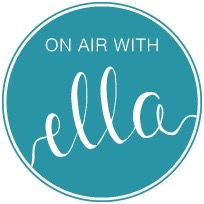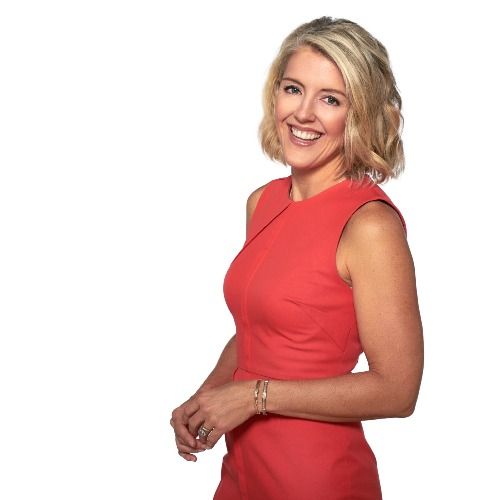⚡️MINI⚡️ Too Much Screen Time? Blue Light Impact on Sleep, Vision, & Skin
A bite-sized boost to your day! "30 hours of screen time increases skin inflammation by 40%!!" - let's talk about BLUE LIGHT! In this mini:
- Effects of Blue Light on the Eyes
- Impact on Retina and Vision
- Children and Blue Light Sensitivity
- Effects of Blue Light on Skin - it's aging us faster!
- Nighttime Screen Use and Sleep
- Blue Light Blocking Glasses
🎧 FULL EPISODE: 270: Blue Light is Aging Us
📝 SHOW NOTES: https://www.onairella.com/post/270-blue-light
🌟 Guest: Dhruvin Patel, Ocushield
🔔 SUBSCRIBE/FOLLOW in this app to get full-length, weekly episodes!
--------------------------------------
NEW NEW NEW 🌟 21 DAYS OF PUSH UPS 🌟 We start our next challenge April 1st in Instagram! Connect with me at @onairwithella for all the details.
🎧 Free Custom Playlist - grab yours here.
-----------------------------------
👭 Join us for our next women's event in DC! Get on the waitlist HERE.
💟 Treat Ella to a Coffee? For the cost of a cup of ☕️ you can help us grow - thank you! Make your donation here.
🛍️ DISCOUNTS & PROMOS - shop, save and support:
- Build and keep muscle. Shop Kion Amino Acids - promo code ONAIRELLA
- "SLEEPYTIME" Kill Switch Hot Chocolate - I LOVE this stuff!!!
>>> See all of my discounts & recommended brands right here!
-----------------------------------
On Air With Ella is for women who want to feel better, look better, live better - and have more fun doing it. This is where we share simple strategies and tips for living a bit better every day. If you’re interested in mindset and wellness, healthy habits and relationships, or hormone health, aging well and eating well, then you’re in the right place.
Connect with Ella:
☎️ Leave a voice message: +1 (202) 681-0388
Transcript
Welcome to this On Air with Ella mini-sode, a little bite-sized boost to your day, always quick, always thought-provoking, and always under 10 minutes. Let's go. Tell me, what is blue light? What are we even talking about? I mean, the sun emits blue light, right? And so do light bulbs. But we are exposed to more blue light than ever, and perhaps more than we were designed to, because of the obvious widespread use of LED devices. Computers and laptops, flat screen TVs, cell phones, tablets, they all emit high and I would say unnatural amounts of blue light. Is that fair?
Dhruvin Patel:Yeah, so let's go into this a bit deeper. So if we look at 380 to 450 nanometers, right, that harmful blue light is the blue light that impacts our eyes. So that cumulative exposure, it causes visual stress on our visual system, which leads to eye strain, fatigue and headaches. Now blue light from 450 to 470 nanometers is the blue light that impacts our sleep and that's because that blue light suppresses melatonin which is the hormone which tells our body it's now time to go to bed right. Now the sun as you rightly said is a big emitter of blue light and it's probably the biggest emitter of blue light. But what the problem here is, is we're looking at screens directly. It's not indirect lighting, whereas lighting around us and the sunlight is indirect, unless you're someone that looks right into the sun, and then that's a different story. But for the rest of us, you know, work from screens, that's eight hours a day. you play, you connect with family or friends on a screen again a few hours in the evening, we are increasing our time on screens and therefore increasing our direct exposure to blue light. So that cumulative exposure that we should be concerned about.
ELLA:Talk to me about what this is doing to our retinas, to our eyes.
Dhruvin Patel:Yeah, sure. So, you know, there's numerous studies out there that have been done that are in vitro studies, which are, you know, in the lab looking at cells in mice or animals. And then there's also cohort studies where they follow people around, they look at the impacts of them. And what's happening with cumulative exposure to blue light, what we're seeing in the retina is that there's clear signs of something called oxidative stress. And what that means is the cells in the retina get damaged and then can manifest as a broken cell. And we know our retina is responsible for converting light into images. So the light it sees, it sends the signals to our brain, and our brain says, hey, this is the image you're seeing, right? Now, if the retina is impacted, then the quality of that image that your brain is receiving, or the light that it's receiving, is not going to be good, and therefore it's going to affect your vision. Now, there's these early studies which are showcasing that blue light, you know, in a lab setting can impact us in that way. But what's happening now is there's no one that's prepared, or there's no research that's been long enough, done long enough to follow us around for two, three, four decades to say actually, you know, screens have been only been around for two or three decades, right? Smartphones started in kind of the 2005. So it's only been really around for one decade, but there's been no studies that follow people around for such a long period of time. And you can control people to make sure they use screens for a certain amount of time in a certain way. So that research isn't going to happen. It's just too, it's just impossible. So what we're saying here is, well, we're looking at the studies that have been done in research, in labs, et cetera, and it's showcasing, well, if there's early signs of this is what blue light can cause to our retina, it's on ourselves to look at this with a lens on to say prevention is always better than cure.
ELLA:Yes, and this is based on absolutely no research whatsoever, but it just seems to me like sunlight, you know, it's been here for a while. Like that seems like a much more natural exposure to me and the one that we were designed to receive and we weren't necessarily designed to receive this level of concentration at this proximity. Am I understanding correctly that almost all blue light passes straight through to the back of your retina and that's actually important? when it comes to increasing the risk of macular degeneration? Is that right?
Dhruvin Patel:Yes. So a lot of the blue light goes back to the retina and to the lens and the cornea in the front of your eye. It usually should absorb harmful light, but it doesn't because for whatever reason, our eyes are not made to absorb that. But yeah, you're more at risk of that issue. Now, what is conclusive is the short term impacts from blue light on the eyes and the visual system. typical eye strain, the headaches, the migraines that you'll probably suffer from after three or four hours, or definitely in the evening, you're going to feel these impacts. So that's something that's definitely there.
ELLA:Tell me why this is arguably worse in children.
Dhruvin Patel:Yeah, sure. So kids, something known as the lens in the eye. So this is where when you're older, you develop cataracts. This part of the eye in children does not develop until their teenage years. So children's eyes don't have a lens in them that's fully developed, and therefore they're twice Add susceptible to uv and blue light damage than teenagers or adults and if we look at children now there's a lot more adoption of smartphones so it's a big risk for them as well you know that they are now increasing their blue light exposure and again, check it so new that it's gonna take another decade or so for research to show on what kind of impact these things are having on. on kids but we already know yeah the lens is not present until teenage years so we're going to put two and two together and actually you know they're more at risk than adults.
ELLA:What is this doing to our skin? And I know, I know that you're an optometrist, but do you have some insight as to what we're actually doing to our skin when we're sitting this close to this concentration of blue light?
Dhruvin Patel:Yeah. So Unilever released a study last year, which said 30 hours of screen time increases skin inflammation by 40%. And what that means is reduction of elasticity in the skin, which effectively contributes to early aging of the skin. If you think about it, we're on our screens and it's our face which is exposed to the blue light from the screens. And again, it's in a close proximity, especially those of us that scroll on TikTok or Instagram late in the evening. Again, it's right on our face. So yeah, it impacts our skin as well.
ELLA:And I mean, how many of us lie in bed and look at our phones, and I'm not even going to pretend that I'm not going to do that. And, and what's worse driven is I do that more personally, I do that more when I can't sleep. So I can't sleep, I just need to zone out, chill out for a bit. Now, about 50% of the time I'm reading a book and the other 50% of the time I am looking at my stupid phone. Therefore, I am projecting blue light, just beaming light directly into my eyes, you know, when I'm trying to go to sleep, which is about the dead last thing that we want to do. So am I doing myself any better, Druvin, if I'm wearing blue light blocking glasses, which I now keep on my nightstand? So, okay, baby steps. And I put on blue light blocking glasses when I pick up my phone at night. Is that better?
Dhruvin Patel:It is, yeah, because you're going to be filtering out that harmful blue light, right, which is going to help you get to sleep. But what's more important is what you've done before getting into bed. Your body should be ready to go to sleep before you get into bed. You should be feeling tired, not due to exhaustion, but because the melatonin levels are high in your body. So I'd argue wearing those blue light blocking glasses or filters in the evening from when sunsets ideal, but obviously if you're in a hot country or it's a summer, you know, sun's there until nine, 10. So it's still, the sun's still going to be there. So it's late, but definitely in the winter times, you know, you, you feel it more. Um, but yeah, try to limit in blue light exposure as early as you can in that evening time.
ELLA:OK, I honestly wanted to keep this kind of short and sweet because I just think that this is something that people don't know enough about. And so today, I really just wanted to accomplish sharing the problem statement so that we understand, like a big part of our mission is just to understand the risks and then choose to do what we want to do about it and discard the rest. In this case, I don't think that we are aware enough as to what we're exposing ourselves to for hours and hours and hours a day. Thank you so much.
Dhruvin Patel:Thanks so much for having me.
ELLA:Thanks for joining me for this mini episode of On Air with Ella. Tune in for our full episodes once a week. See you next time.




